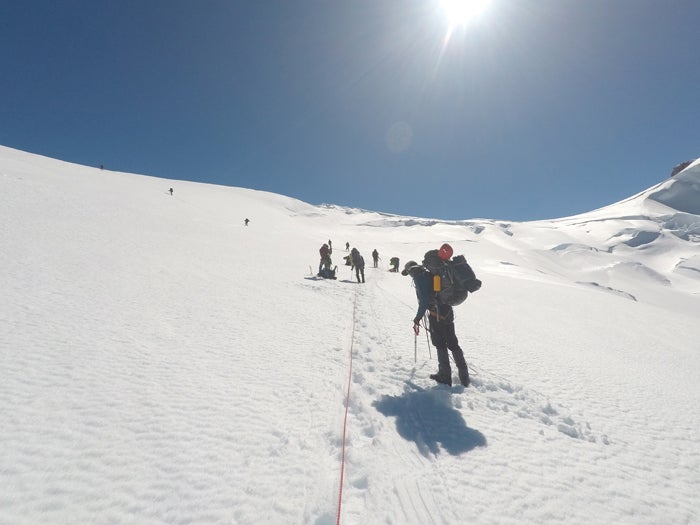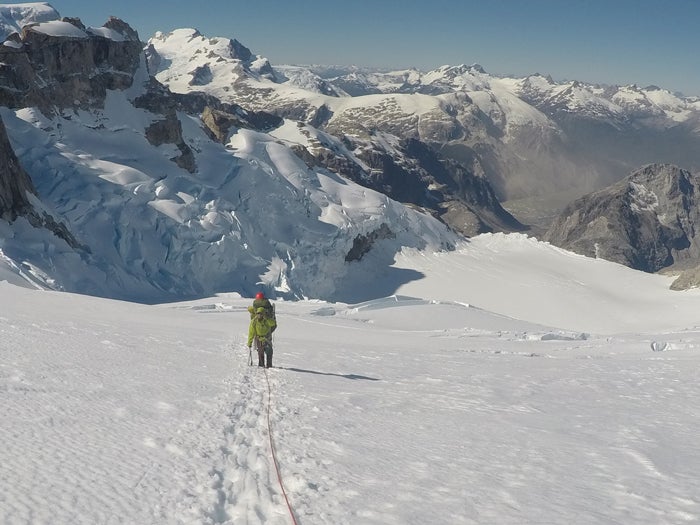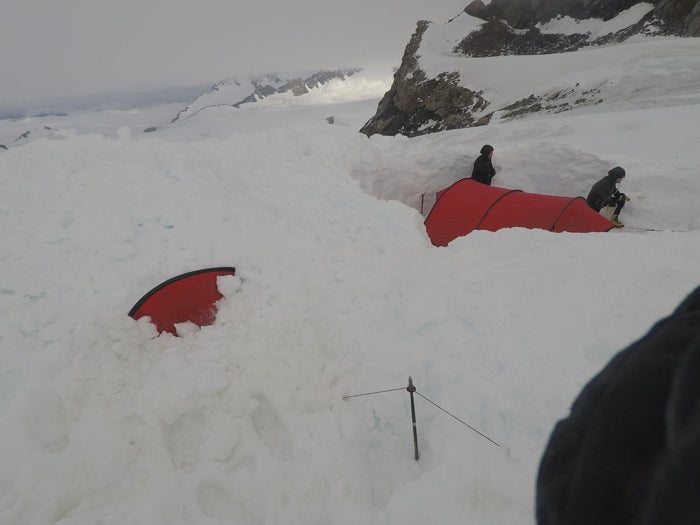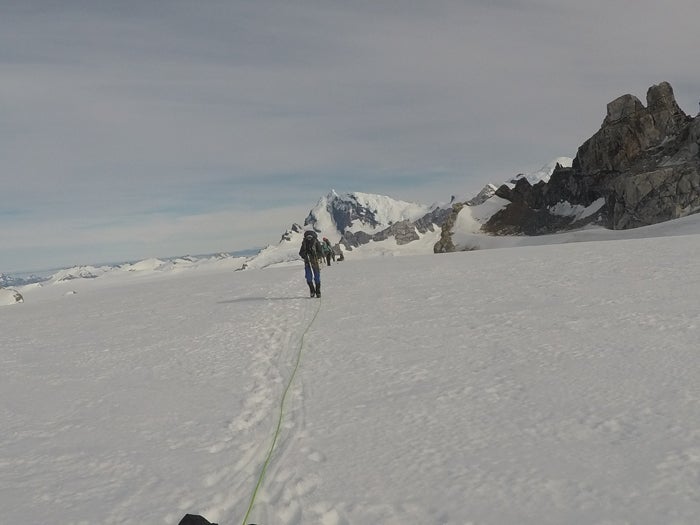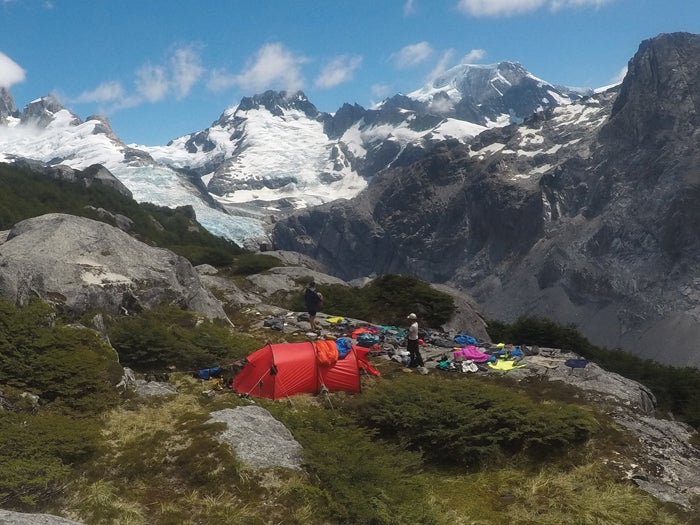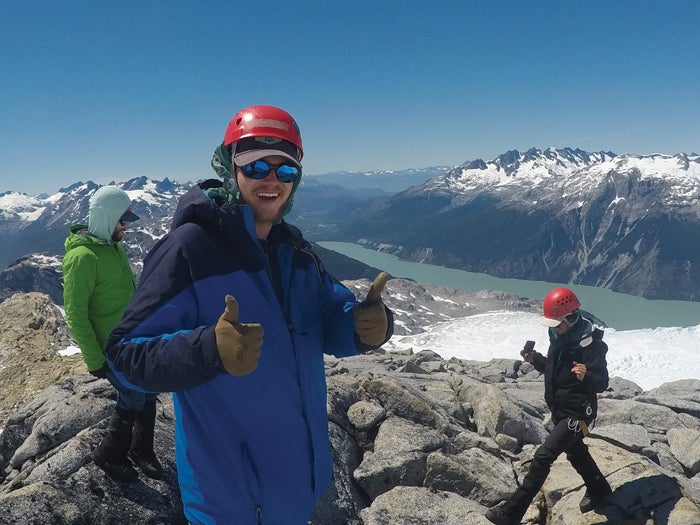Frozen, fun adventure: At the bottom of the world, Steven Page explores Patagonia
Published 12:00 am Sunday, March 4, 2018
By Susan Shinn Turner for the Salisbury Post
Imagine being socked in by a blizzard for three days, rising every hour or so in teams of two to shovel snow off your tent so it won’t collapse. Imagine learning to mountaineer on a glacier, tying knots, being roped to others so no one accidentally falls into a crevasse.
Now imagine doing it all for fun — FOR FUN!!!
That’s exactly what Steven Page did for six weeks, leaving the day after Christmas — learning to live on the Glacier Leonnes, setting out from Coyhaique, Chile, in the Patagonia region of South America. The bottom of the world. Before that, he also spent a week in Machu Picchu, Peru, with another tour company.
Steven, who turns 25 in March, graduated in December from Virginia Commonwealth University. On Feb. 20, he began work on nuclear submarines and aircraft carriers at the Norfolk Naval Shipyard.
In between, Steven, the son of Tommy and Mary Willis Page of Salisbury, decided he wanted an adventure.
He found one.
He’d done the Outward Bound program in high school, and wanted a similar experience. He wanted to go somewhere exotic, faraway, off the grid. In his research, he found a glacial mountaineering program with the National Outdoor Leadership School (NOLS).
Here’s what the Web site says:
“Among the peaks, expansive rivers, and thick coastal rain forests of the Andes, you’ll learn about big-glacier mountaineering and camping in challenging weather. You’ll learn about outdoor living and leadership, plus teamwork and communication, in addition to the technical skills of glacier travel, hazard evaluation, and rope work. This course will offer you the challenges of unknown terrain and fierce Andean weather, preparing you to lead and travel in challenging situations long after your course ends.”
“I said, ‘That sounds perfect. That’s it,’” Steven says.
He paid for the trip through a series of summer and fall internships he completed. Steven has an undergraduate degree in chemistry from UNC. His sister, Anna, 23, is working in New York City in the fashion industry.
Fortunately, he was able to rent a lot of the specialized equipment. He joined a group of 11 members, 10 men and one lone woman, ages 18 to 25, with one 40-year-old. Three instructors eventually transferred leadership decision of the trip to the group.
“They weaned us off them,” Steven says. “It became us figuring out what to do.”
They had to deposit food caches in various places, and pack all their gear in and out. Organization was key.
“We could have lollygagged and killed a bunch of time,” Steven says. “It was up to us to get moving.”
There were two days on the front of the trip for travel time at the NOLS farm, at which time they spent packing food and supplies. A six-hour bus ride south transported the group to the ice fields.
“It was super remote, in the middle of nowhere,” Steven notes.
They also took two boat rides to reach the glacier and hike in from there. They saw a couple of day hikers while they were near the glacier. No one else.
Once at a snow camp, the team spent a week learning to use crampons — those metal spikes affixed to boots for hiking on ice — and all the details of mountaineering.
“It’s a very specific set of skills,” Steven says.
They practiced crevasse rescues and self-arresting stops, which means flinging your ice ax into the snow and digging in your feet as you are sliding every which way.
“It was fun to spin around the snow,” Steven says, using that word “fun” once again.
The group basically had the same goals: to learn leadership skills, get out in nature, unplug.
A couple of members of the team got hypothermic during the trip, but that was quickly resolved, Steven says. “It was not really that cold. It was maybe in the teens at night and the 40s during the way. That was a complete guess. In the morning, the snow would be hard, then get slushy in the afternoon. It was almost always windy — an estimated 50 to 60 miles per hour at times — which made it feel colder.”
The instructors had a satellite phone only for emergencies. Otherwise, Steven was unplugged and off the grid the whole time he was there. He told his parents that no news would be good news.
Of course, everything they did was weather dependent, so they arranged their schedules on a day-to-day basis.
“It was weird waking up and not knowing what we were going to do,” Steven says. “We made group-based decisions. The instructors told us it was our expedition and asked us what we wanted to get out of it.”
The group was stuck at the snow camp for 2½ days in a cold rain. Steven stayed in his four-man tent for 20 hours.
Steven believes the leadership skills he learned will transfer at his new job.
“I feel much more comfortable being in charge now,” he says. “You’ve got the practice. You make mistakes, and learn from them.”
As is the case with most young men his age, food was a priority for Steven. His group of four had 80 pounds of food, and had to figure out how to put menus together — and make the food last for 10 days. The rest of the food for the two-week stay was placed in the middle of the glacier beforehand.
“I found out mountaineering was a lot of moving stuff around where you need it,” Steven notes.
Some groups, he says, ran out of food. Not his group. “I was very big on planning it out.”
One of the best things he made, he says, was a chocolate cake fashioned out of cocoa powder, cream of wheat, cornmeal, flour, sugar, yeast, and eggs. He cooked it on a portable gas stove, and his group ate it for dinner.
“It was a really hearty chocolate cake,” Steven reports. “It was really filling and really good.”
Because of their high activity level, group members each aimed for 3,000 calories a day, so, as he says, nutrition was high on Steven’s list. Their foods included pasta, salami, cheese, vegetable protein, nuts, peanut butter and granola.
“We ate pretty well,” Steven says. “I wanted to lose some weight, but that did not happen.”
Steven has skied over the years, but could always go into the lodge if he got cold. That wasn’t the case when the group was socked in for three days by a blizzard. One night, the snow kept on coming, and the team went out two by two every two hours to shovel snow.
Steven donned rain pants, a jacket, boots, headlamp and gloves to work. They shoveled trenches around the tents for the show. Three of the four tents eventually had to be abandoned, with 10 people in one tent and the rest of the group in a snow cave. They frantically threw everything in one tent and piled in.
Although it was intense, Steven says, “it was kinda fun at times. We were making jokes and making light of the situation.”
Steven worried one point when he was taking a break and was cold. If they lost the remaining tent, what would they do? The instructors were not scared, however. They just said everyone could stay in the snow cave.
“It was good to hear they weren’t scared,” Steven says. Afterward, however, the instructors told the group they’d never been through a storm of this endurance, and never lost 75 percent of their tents.
They only slept 10 to a tent one night. The next day, they repaired the tents and them all set up again.
So at this point, you’re probably thinking, what about going to the bathroom?
Steven and the guys bought portable urinals. Eventually, the young woman learned to use it, too.
“We were all very proud of her,” he says. As well they should be.
Being off the grid, Steven says, was an interesting experience. No one sat around, staring at a phone screen.
“It was kinda nice and kinda freeing, not thinking, ‘Where’s my phone?’ and ‘Is my phone charged?’” Steven says. “We just talked and hung out. One guy brought his harmonica and we had jam sessions.”
They read in the tents, exchanging paperback books. They played 20 questions, and cards if the cards weren’t too soggy. Steven wrote a lot in his journal, and wrote letters home, which he mailed later. When there was nothing to do, he slept.
When Steven leaves to go somewhere he always checks for phone, keys and wallet. On the expedition, he checked for his lip balm and stove lighter.
The time away from technology proved a good exercise for Steven as well, as he can’t have anything at work that takes pictures. His phone will be locked up eight hours a day.
His parents are glad to have him back stateside, although they, too, appreciate the experience.
“I am big on personal growth and leadership development,” Tommy says. “The travel to different countries exposes you to different cultures, food, and ways of doing things, and helps you understand how fortunate we are with all of our modern conveniences. I believe you gain what I refer to as ‘quiet confidence.’ Surviving a blizzard gives you the confidence to get through issues life will throw at you. Steven will use these skills for the rest of his life.”
“We love adventures,” Mary Willis says. “It’s our thing.”
Still, it was hard for this momma not to hear from her son.
“I tried to stay busy,” she says. “This is the way it used to be when we just had land lines. I knew he was being taken care of and having the experience of a lifetime.”
She also thought about those who serve in the military and are out of contact for long periods. “So I tried to keep it in perspective. I missed him, but I was OK.”
As a result of this trip, Steven says he’ll be more comfortable on future camping trips —save for worrying about bears. The only wildlife they encountered at lower altitudes was annoying, biting horseflies.
Whenever he sets out on another outdoor experience, he’ll be armed with confidence.
“You just figure it out,” he says.
And his adventure on the bottom of the world will likely be at the top of his thoughts for sometime to come.
“It was a blast,” he says. “A lot of fun.”


